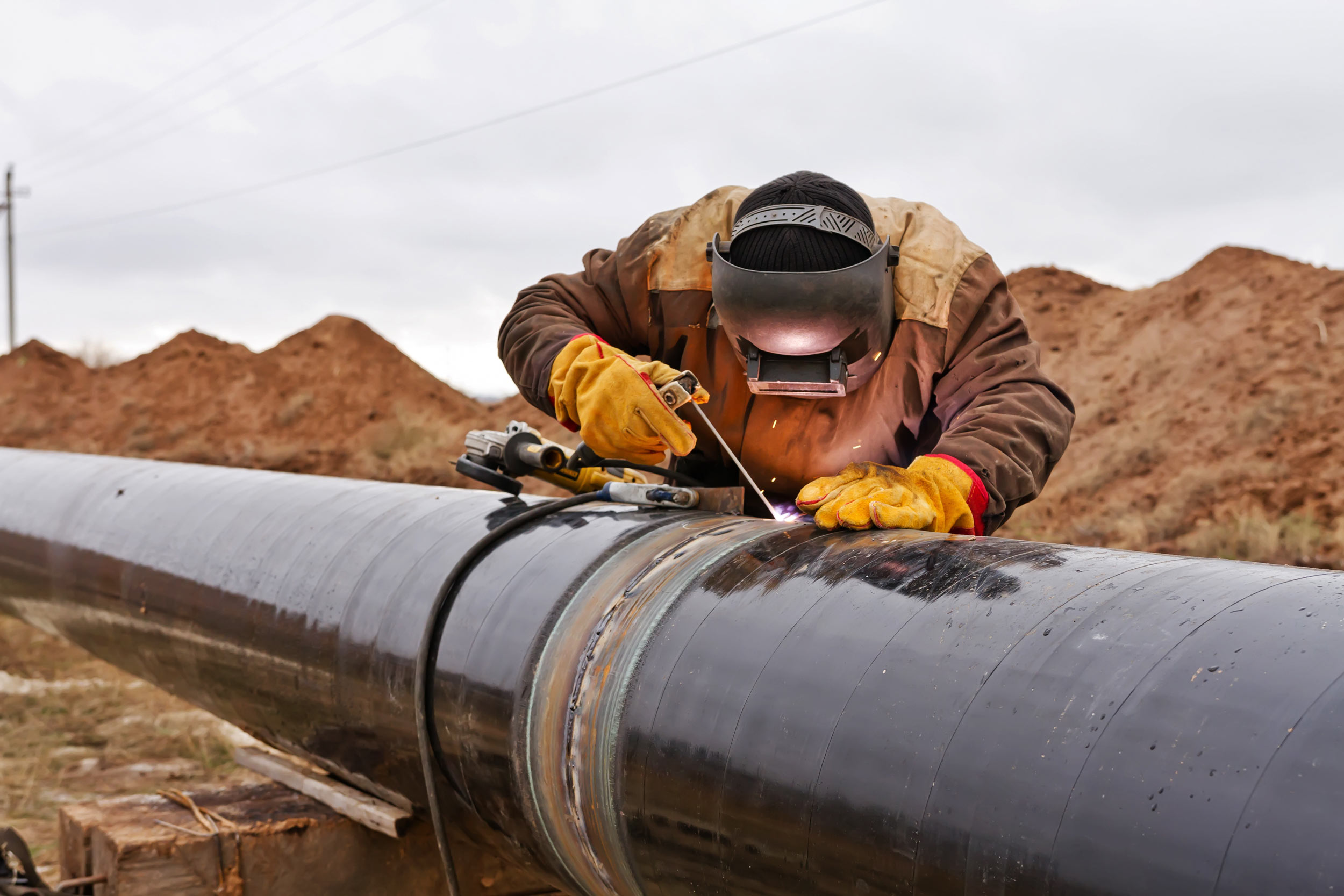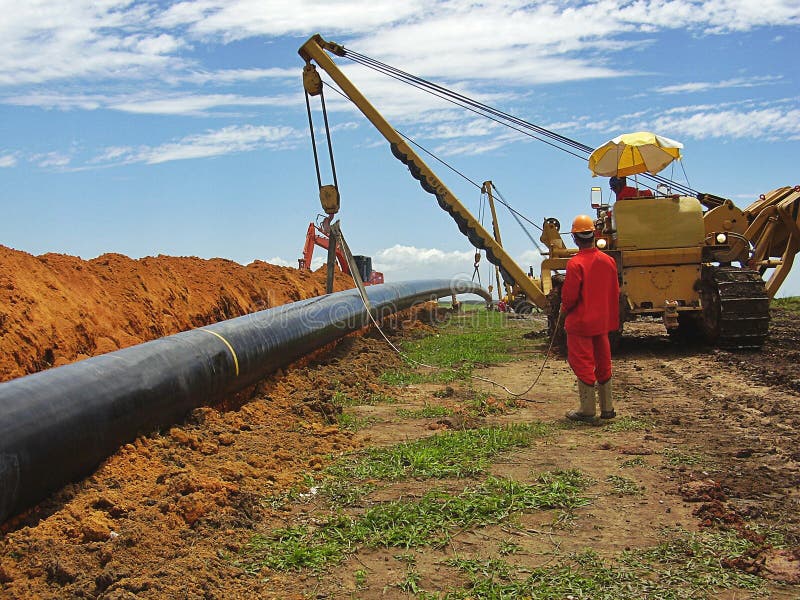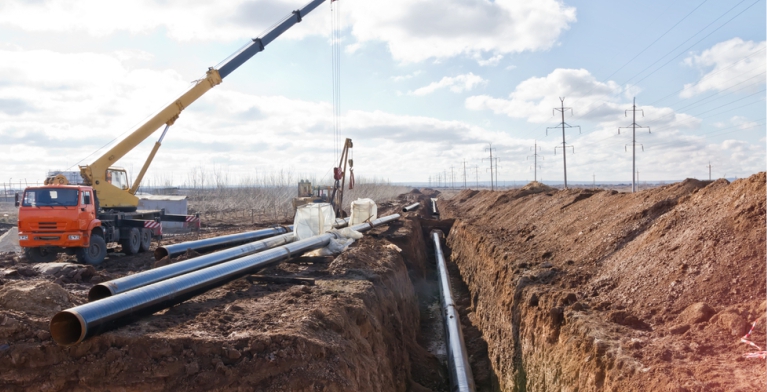Why Pipeline Construction Is Essential for Power Framework Development
Pipeline construction plays a critical function in the development of power framework, functioning as the backbone for the transport of necessary sources like oil and gas. This detailed network not just facilitates effective distribution however likewise strengthens financial development through work production and regional investment. Additionally, innovations in security modern technologies are attending to ecological problems, placing pipelines as a foundation of sustainable energy techniques. The intricacies surrounding pipeline tasks elevate critical concerns regarding regulatory structures and their long-term influence on communities and communities. Discovering these dimensions reveals a complex story that calls for cautious consideration.
Duty of Pipelines in Power Supply
The crucial function of pipelines in power supply can not be overemphasized, as they function as the backbone of modern-day power infrastructure. Pipelines are crucial for the efficient transportation of numerous kinds of energy, including oil, natural gas, and fine-tuned items. They facilitate the activity of these sources from removal websites to refineries and distribution centers, making sure that power gets to consumers in a prompt manner.The construction of pipelines includes careful preparation and adherence to regulative standards, showing the intricacies of the power market and environmental factors to consider. Efficient pipeline networks are designed to lessen transit times, minimize expenses, and improve safety, while additionally dealing with potential environmental influences. The capacity to transfer big quantities of energy over fars away makes pipelines a favored option for power companies looking to optimize their supply chains.Moreover, pipelines add to power protection by branching out supply paths and sources. As worldwide power demands change, pipelines enable regions to accessibility different power supplies, mitigating threats connected with reliance on solitary sources. This diversity cultivates competitive prices and stabilizes markets, which is essential in a progressively interconnected global economy.In addition to their logistical advantages, pipelines support local economic climates by creating work throughout construction and maintenance phases. The existence of a durable pipe framework additionally attracts financial investments in energy jobs, additionally improving local advancement. Ultimately, pipelines are crucial to the power market, supplying a trustworthy and effective ways of transportation that underpins financial growth and sustainability.

Benefits of Effective Transport
Effective transport through pipeline systems uses considerable advantages, consisting of lowered transport costs and improved delivery speed. These advantages not just boost the total economics of power circulation yet also play an important role in minimizing the ecological effect associated with power transportation. As power demands remain to climb, the importance of maximizing transport techniques becomes significantly evident.

Reduced Transportation Expenses
Lowered transportation expenses represent a remarkable advantage in the domain of power framework advancement. The construction of pipelines offers a much more financially sensible methods of carrying energy sources compared to different techniques such as trucking or rail transportation. Pipelines, as soon as established, permit the continuous circulation of oil, gas, and other products over lengthy ranges with marginal functional costs.One of the main factors for decreased transport expenditures is the performance of pipeline systems. They can move huge volumes of materials concurrently, therefore spreading out repaired prices over a greater amount of product. This bulk transport capacity especially reduces the expense each, making energy sources more budget friendly for customers and companies alike.Additionally, pipelines minimize the threats and costs connected with handling and saving unstable products. Unlike rail or roadway transportation, which can sustain hold-ups and damages, pipelines supply a more secure and more constant technique of energy conveyance. Consequently, this reliability enhances the financial expediency of power tasks, enabling better pricing structures in open markets. Ultimately, decreased transport costs foster an even more sustainable energy industry, promoting wider gain access to and motivating investment in additional development.
Boosted Distribution Rate
Pipelines considerably improve distribution rate in power transport, offering a vital advantage over conventional techniques such as trucking or rail systems. The continuous flow of materials through pipelines permits a constant and effective transportation procedure, lessening hold-ups connected with loading and dumping. This constant movement is specifically important for energy resources, where need can vary rapidly.Moreover, pipelines can operate around the clock, unaffected by web traffic conditions or weather-related disturbances that can restrain road or rail transportation. This dependability assures that energy items reach consumers quickly, sustaining functional requirements and boosting financial security. In addition, the scalability of pipe systems assists in the handling of large quantities of energy, which is important for meeting the expanding requirements of industries and property sectors.Furthermore, the integration of advanced surveillance and control technologies in pipeline systems enhances the shipment process. These technologies permit real-time monitoring of circulation prices and system pressures, guaranteeing that any type of prospective issues are resolved promptly. Overall, the enhanced delivery speed offered by pipelines is a considerable consider optimizing power infrastructure and ensuring that supply chains continue to be robust and receptive to market needs.
Environmental Influence Factors To Consider
The benefits of quick energy transport prolong beyond logistical benefits; they likewise incorporate substantial ecological considerations. Effective pipeline systems permit the transportation of power resources with marginal disturbance to communities compared to alternative methods such as truck or rail transportation. Pipelines can assist in the activity of oil, gas, and other products in a highly concentrated way, which lowers the carbon footprint associated with energy distribution.Moreover, pipelines are created with sophisticated security and surveillance innovations that greatly lower the threat of spills and leaks. An efficient pipeline facilities minimizes the need for constant transport tasks, which can bring about decreased greenhouse gas exhausts in time (Midland Pipeline Construction Authority). The ability to carry power sources straight to consumers decreases dependence on more contaminating transportation approaches, better benefiting air quality.In addition, tactical pipeline positioning can assist maintain delicate environments by following existing passages, thus minimizing the impact on wild animals and natural landscapes. Overall, the construction of pipelines not just sustains power framework development but also gives an ecologically liable methods of moving power, contributing to a much more lasting future
Economic Influence of Pipeline Projects
The economic impact of pipeline jobs extends beyond mere transport efficiency, substantially affecting regional and regional economic situations. These efforts create job possibilities throughout both construction and ongoing operations, promoting area development (Pipeline Construction Authority). In addition, the excitement of financial growth via increased investment and facilities improvement is an essential benefit of pipeline construction
Task Production Opportunities
While energy framework tasks often face examination, they present significant job creation possibilities that can positively influence neighborhood economic situations. Pipeline construction projects call for a varied variety of skilled labor, consisting of engineers, project managers, and specialized service technicians, along with inexperienced laborers for different duties. This complex demand for labor can bring about the development of hundreds of work during the construction stage and commonly leads to long-term employment possibility once the infrastructure is operational.In enhancement to guide work, pipeline jobs boost neighborhood economies by producing secondary work opportunities in sectors such as transport, manufacturing, and hospitality. Regional organizations benefit from raised need for products and services, contributing to overall financial wellness. In addition, the increase of employees can bring about raised tax obligation revenues for local governments, which can be reinvested in social work and infrastructure.Moreover, pipe construction jobs frequently focus on employing local employees, promoting a feeling of area financial investment and support. By connecting the space in between power supply and demand, these projects not only boost power safety and security yet additionally work as stimulants for economic advancement, reinforcing the relevance of pipeline construction in task creation initiatives.
Financial Growth Stimulus
Pipeline projects function as an effective economic development stimulus, driving considerable investments into local and local economic climates. The construction and operation of pipelines develop a causal sequence, creating need for products, equipment, and solutions (Midland Pipeline Construction Authority). This influx of resources supports local services, from making to hospitality, promoting a robust financial environment.Moreover, these projects create significant tax incomes for districts and states, which can be reinvested in public services, facilities improvements, and area advancement efforts. The economic advantages expand beyond instant work creation, as skilled labor is frequently needed for continuous upkeep and operations, guaranteeing lasting work opportunities.Additionally, the enhanced energy facilities promotes the efficient transport of resources, potentially reducing energy expenses for customers and companies alike. By improving energy ease of access, pipelines can draw in brand-new markets and promote growth in existing markets, adding to general economic diversification
Ecological Factors To Consider and Innovations
Balancing power needs with ecological integrity ends up being significantly essential as pipeline construction expands. The search of reliable power transportation should make up environmental impacts, demanding ingenious techniques and modern technologies that lessen environmental interruption. Modern her explanation pipeline projects are increasingly incorporating innovative official source environmental assessments at every phase, making certain that possible dangers are identified and alleviated early in the preparation process.One notable advancement in this field is the adoption of trenchless technology, which permits the installment of pipelines without extensive surface area interruption. This technique reduces habitat fragmentation, maintains existing ecosystems, and reduces the carbon footprint linked with typical excavation methods. In addition, real-time tracking systems equipped with sensing units enable drivers to identify leaks or environmental changes quickly, consequently assisting in timely responses to prospective hazards.Moreover, the unification of ecologically pleasant products and construction techniques is getting grip. Biodegradable boring liquids and corrosion-resistant finishes can greatly reduce the environmental footprint of pipeline projects. Business are additionally committing to bring back environments post-construction, using native plant species to assist in environment recovery.Collaboration with environmental companies and neighborhood communities is crucial - Pipeline Construction Excellence. Involving stakeholders in the decision-making process fosters transparency and promotes sustainable methods, making certain that power infrastructure growth aligns with environmental stewardship
Difficulties in Pipeline Construction
Amid the growing demand for energy framework, numerous challenges complicate the construction of pipelines. Among the key issues is the geographical irregularity of pipeline paths, which can pass through varied landscapes, consisting of hills, rivers, and city areas. Each setup calls for tailored engineering solutions to attend to environmental management, geological security, and logistical constraints.Additionally, the public perception of pipeline projects often positions a considerable hurdle. Local communities might reveal issues concerning potential environmental influences, security dangers, and disruption during construction. This opposition can result in delays, increased costs, and the necessity for considerable area interaction strategies to cultivate acceptance.Moreover, labor scarcities in experienced trades even more complicate pipeline construction efforts. As the demand for energy infrastructure grows, the availability of skilled personnel reduces, which can cause job delays and increased labor prices. The pipeline industry should buy workforce growth efforts to grow a knowledgeable labor swimming pool efficient in satisfying the advancing demands.Safety stays a paramount issue throughout the construction procedure. The sector faces the difficulty of ensuring that all security procedures are complied with, as also small gaps can lead to significant accidents. This requires rigorous training and oversight to preserve operational integrity.Lastly, changing why not find out more product costs can affect project budget plans and timelines. The need for high-quality materials, combined with market volatility, needs mindful monetary preparation and risk mitigation approaches to maintain jobs on track. Resolving these obstacles is important for the successful and efficient construction of pipelines as part of a durable power framework.
Governing Framework and Conformity
The regulatory structure regulating pipe construction is complicated and complex, requiring conformity with a variety of federal, state, and regional policies. At the federal level, agencies such as the Federal Power Regulatory Commission (FERC) and the Pipeline and Hazardous Products Security Management (PHMSA) play critical functions in managing pipe jobs. FERC controls the transportation of gas and oil, accepting jobs based on financial requirement and public interest, while PHMSA focuses on security criteria and the stability of pipe operations.State laws can differ considerably, with specific states imposing their own allowing processes, safety laws, and ecological assessments. State public energy payments might need additional examination of suggested routes to assure very little disturbance to communities and environments. Compliance with the National Environmental Policy Act (NEPA) is additionally required, mandating thorough environmental effect evaluations prior to project approval.Local laws may further complicate the conformity landscape, as towns frequently have certain zoning legislations, land use laws, and area involvement requirements. Involving with neighborhood stakeholders is not just a regulative requirement yet additionally a best technique to assist in smoother job execution.Moreover, the regulatory landscape is continuously progressing, affected by public sentiment, technical advancements, and environmental policies, demanding constant watchfulness from pipe drivers. Guiding via this complex governing structure is vital for verifying that pipe construction jobs are not just lawfully compliant yet additionally socially accountable and ecologically sustainable, thus adding to the general efficiency of power facilities growth.
Future Patterns in Pipeline Framework
A significant improvement is underway in pipe framework, driven by advancements in innovation, advancing energy needs, and raising ecological consciousness. As the global power landscape shifts towards sustainable sources, pipeline systems are adjusting to suit diverse energy types, including gas and biofuels, while also integrating a lot more innovative tracking and safety technologies.One notable fad is the consolidation of electronic services, such as Internet of Points (IoT) tools and expert system (AI), which boost real-time surveillance and anticipating maintenance capacities. These technologies not just boost operational effectiveness however also markedly minimize the risk of leaks and crashes, guaranteeing greater environmental protection. In addition, using advanced materials, such as composite pipes, is obtaining traction because of their toughness and resistance to corrosion, more prolonging the lifespan of pipeline systems.Moreover, the focus on sustainability is prompting the growth of greener construction practices. Methods such as trenchless technology decrease land disturbance and ecological effect, aligning pipeline tasks with modern environmental criteria. Additionally, regulative frameworks are developing to promote transparency and responsibility in pipe operations, making sure stakeholders are extra educated concerning potential dangers and advantages.
Often Asked Questions
Exactly How Do Pipelines Compare to Other Transport Approaches for Power Resources?
Pipelines provide a cost-efficient, efficient, and eco-friendly method for carrying energy sources contrasted to options like trucks and trains, which often sustain higher functional costs, better land use, and raised greenhouse gas exhausts. - Pipeline Construction Excellence

What Products Are Commonly Used in Pipeline Construction?
Typical materials used in pipeline construction include carbon steel, stainless-steel, and plastic composites. These materials are selected for their strength, resilience, rust resistance, and suitability for numerous environmental conditions and kinds of moved energy sources.

Just how Lengthy Does It Usually Require To Construct a Pipe?
The duration for pipe construction varies substantially based on variables such as length, terrain, and governing requirements. Generally, it can vary from a number of months to a few years, depending on job complexity and environmental factors to consider.
Who Are the Trick Stakeholders in Pipeline Projects?
Secret stakeholders in pipe projects consist of government agencies, regulatory bodies, energy business, environmental companies, regional neighborhoods, and landowners - Midland Pipeline Construction Authority. Each team plays an important duty in preparation, permitting, construction, and recurring operations of pipeline infrastructure
What Are the Primary Precaution Throughout Pipeline Construction?
During pipeline construction, main precaution consist of strenuous site assessments, adherence to regulative requirements, extensive training for employees, the usage of individual safety tools, and continuous monitoring of environmental conditions to minimize threats and assure operational safety and security.
Comments on “Top 10 Reasons Pipeline Construction Excellence Shapes Sustainable Infrastructure”